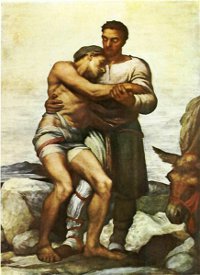
The disciples encounter the empty tomb of Jesus Christ, as depicted by William Hole, 1908.
One of the most perplexing things about the Easter story is that Jesus’ own disciples just didn’t get it.
All the way up to (and even beyond) Jesus’ resurrection, his disciples—who had traveled, studied, and ministered under Jesus for most of his public ministry—seem remarkably confused about what’s happening.
During the events of Easter week, we see many examples of the disciples failing to comprehend what Jesus was plainly telling them. For example, note the disciples’ reaction to Jesus’ direct statement that Judas would betray him:
After he had said this, Jesus was troubled in spirit and testified, “Very truly I tell you, one of you is going to betray me.”
His disciples stared at one another, at a loss to know which of them he meant. One of them, the disciple whom Jesus loved, was reclining next to him. Simon Peter motioned to this disciple and said, “Ask him which one he means.”
Leaning back against Jesus, he asked him, “Lord, who is it?”
Jesus answered, “It is the one to whom I will give this piece of bread when I have dipped it in the dish.” Then, dipping the piece of bread, he gave it to Judas, the son of Simon Iscariot. As soon as Judas took the bread, Satan entered into him.
So Jesus told him, “What you are about to do, do quickly.” But no one at the meal understood why Jesus said this to him. Since Judas had charge of the money, some thought Jesus was telling him to buy what was needed for the festival, or to give something to the poor. — John 13:21-29 (emphasis mine)
This is a typical scene; the disciples fail to believe or understand what they are plainly told about the events of Easter week. Even after the resurrection, Jesus’ disciples were unclear about what had happened until Jesus explained it to them. Despite the miracles they had seen Jesus perform, they refused to believe Jesus had returned until Jesus repeatedly demonstrated that he was not a “ghost.”
Why did the disciples struggle to believe and understand? Had Jesus failed to warn them in advance about what was going to happen to him?
Actually, Jesus had been predicting his death and resurrection for some time before the actual events of Easter week. Sometimes he spoke in deliberately vague terms; it’s perhaps understandable in these cases that the disciples wouldn’t have picked up on Jesus’ meaning without help. For example, Jesus predicted his death and resurrection early in the gospel of John using a metaphor:
The Jews then responded to him, “What sign can you show us to prove your authority to do all this?”
Jesus answered them, “Destroy this temple, and I will raise it again in three days.” — John 2:18-19
However, in other places, Jesus speaks plainly and directly about his imminent arrest, death, and resurrection:
From that time on Jesus began to explain to his disciples that he must go to Jerusalem and suffer many things at the hands of the elders, the chief priests and the teachers of the law, and that he must be killed and on the third day be raised to life. — Matthew 16:21
Now Jesus was going up to Jerusalem. On the way, he took the Twelve aside and said to them, “We are going up to Jerusalem, and the Son of Man will be delivered over to the chief priests and the teachers of the law. They will condemn him to death and will hand him over to the Gentiles to be mocked and flogged and crucified. On the third day he will be raised to life!” — Matthew 20:17-19
If they had been so specifically forewarned—and especially if they knew in advance that Jesus would rise from the dead—why were the disciples so confused and frightened during the drama of Easter week?
Ultimately, we don’t know the answer. Surely, much of their confusion was simply the result of their being, well, human—like everyone else, they were prone to forgetfulness and misunderstanding. Consider that Jesus’ teachings profoundly challenged the religious assumptions they had grown up with. Because Jesus taught both in plain speech and in parables, the disciples might have had trouble understanding when he was speaking literally and when metaphorically. Perhaps, even though they’d seen him work many life-giving miracles, the disciples couldn’t bring themselves to believe Jesus’ most dramatic claim—that he would die and rise from the grave. And the events of Easter week were stressful, to say the least.
Some Scripture passages also hint at other possibilities. When Jesus made predictions about his death and resurrection, he wasn’t doing so just to warn the disciples in advance. Consider these passages:
Jesus replied, “You do not realize now what I am doing, but later you will understand…. I am telling you now before it happens, so that when it does happen you will believe that I am who I am.” — John 13:7,19
After he was raised from the dead, his disciples recalled what he had said. Then they believed the scripture and the words that Jesus had spoken. — John 2:22
He said to them, “How foolish you are, and how slow to believe all that the prophets have spoken! Did not the Messiah have to suffer these things and then enter his glory?” And beginning with Moses and all the Prophets, he explained to them what was said in all the Scriptures concerning himself. — Luke 24:25-27
He said to them, “This is what I told you while I was still with you: Everything must be fulfilled that is written about me in the Law of Moses, the Prophets and the Psalms.” Then he opened their minds so they could understand the Scriptures. — Luke 24:44-45
Like many prophecies throughout Scripture, Jesus’ predictions weren’t always understood and believed by those who first heard them. Today, we tend to think of predictions purely as “advance warning” about coming events. But the passages above specifically note that understanding often comes after the prophesied events have come to pass. The predictions were made so that when the disciples finally got around to remembering Jesus’ words, they’d see in them further confirmation that Jesus was who he claimed to be.
It’s tempting to scoff at the disciples for their weak faith and ignorance. But to do so is to miss the point: we’re no different. Like the disciples, we don’t always understand what God is doing in our lives. We read God’s clear promises in the Bible, yet often succumb to stress and doubt when life gets tough. Sometimes it isn’t until after God has brought us through a trial that we are able to look back at Scripture and understand that He was with us from the beginning.
God loves us, as He loved the disciples; He wants to bring us into understanding and belief. He wants us to look back at events in our lives, then examine Scripture to see His words and promises confirmed. And while we sometimes want to roll our eyes at them, we can be grateful to Jesus’ hapless disciples for providing us an object lesson in human ignorance… and divine patience.








 I woke up this morning to the sound of thunder.
I woke up this morning to the sound of thunder.